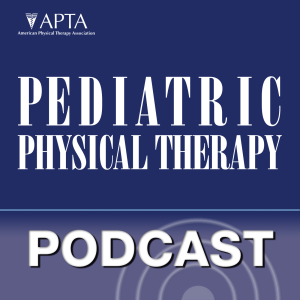
Virtual Sensorimotor Training for Balance: Pilot Study Results for Children with Fetal Alcohol Spectrum Disorders
Tracy Jirikowic PhD, OTR/L, FAOTA, from the University of Washington, Seattle describes her team’s success with the virtual reality-based Sensorimotor Training to Affect Balance Engagement and Learning (STABEL) system for helping children who have neurodevelopmental defects caused by fetal alcohol spectrum disorder.
Influence of External Visual Focus on Gait in Children with Bilateral Cerebral Palsy
For children with bilateral cerebral palsy visual cues are very important to help them control movement and gait—even though they may have impaired vision according to Asa Bartonek PhD, fron Karolinska University Hospital in Stockholm, Sweden, who discusses her group’s study of sensor problems as compared motor problems in limiting movements among these patients.
A Modified Version of the Timed Up and Go Test for Children who are Preschoolers
Age affects the results of the Timed Up and Go test when used in pre-school children according to Evi Verbecque PT, from the University of Antwerp, Belgium, whose group reports a new study with a modified the test adding a toy to make it fun for three, four and five-year olds.The Development and Initial Validation of the Pediatric Neuromuscular Recovery Scale
Elizabeth Ardolino PT PhD, from the University of St Augustine in Austin, Texas, talks about a new scale she and her colleagues have developed to assess recovery among children who have spinal cord injury based on an existing adult scale with modifications to adapt for the big differences between children and adults.Pediatric Obesity: Is There Room for Active Video Game in Prevention or Management?
Active video games can help as a part of an overall strategy to reduce pediatric obesity according to findings of a report from David Thivel PhD, from Clermont Auvergne University in Aubière, France. He explains, however, that overall energy balance holds the key and that such video games should only be part of a strategy including other physical activities and dietary planning.
Student Outcomes of School-based Physical Therapy as Measured by the School Function Assessment
It may be a given—all over America at least—that having the services of a physical therapist is a great benefit to any school, but until now the benefit had not been quantified or evaluated in terms of hard data. This has now changed with a report from a wide-ranging survey in 28 states. Susan Effgen PT, PhD, FAPTA, from the University of Kentucky in Lexington talks about her findings.
view more
More Episodes
Volume 36, Issue 3
 2024-07-17
2024-07-17
 2024-07-17
2024-07-17
Volume 36, Issue 2
 2024-04-02
2024-04-02
 2024-04-02
2024-04-02
Volume 35, Issue 4
 2023-09-20
2023-09-20
 2023-09-20
2023-09-20
Volume 35, Issue 3
 2023-06-30
2023-06-30
 2023-06-30
2023-06-30
Volume 35, Issue 2
 2023-03-28
2023-03-28
 2023-03-28
2023-03-28
Volume 35, Number 1
 2023-01-06
2023-01-06
 2023-01-06
2023-01-06
Volume 34, Issue 4
 2022-09-29
2022-09-29
 2022-09-29
2022-09-29
Volume 34, Issue 3
 2022-06-24
2022-06-24
 2022-06-24
2022-06-24
Volume 34, Issue 2
 2022-04-04
2022-04-04
 2022-04-04
2022-04-04
Volume 34, Issue 1
 2021-12-22
2021-12-22
 2021-12-22
2021-12-22
Volume 33, Issue 4
 2021-10-01
2021-10-01
 2021-10-01
2021-10-01
Volume 33, Issue 3
 2021-06-29
2021-06-29
 2021-06-29
2021-06-29
Volume 33, Issue 2
 2021-03-30
2021-03-30
 2021-03-30
2021-03-30
Volume 33, Issue 1
 2020-12-18
2020-12-18
 2020-12-18
2020-12-18
Volume 32, Issue 4
 2020-10-01
2020-10-01
 2020-10-01
2020-10-01
Volume 32, Issue 3
 2020-06-30
2020-06-30
 2020-06-30
2020-06-30
Volume 32, Issue 2
 2020-03-27
2020-03-27
 2020-03-27
2020-03-27
Volume 32, Issue 1
 2019-12-20
2019-12-20
 2019-12-20
2019-12-20
Volume 31, Issue 4
 2019-09-27
2019-09-27
 2019-09-27
2019-09-27
Volume 31, Issue 3
 2019-06-27
2019-06-27
 2019-06-27
2019-06-27
012345678910111213141516171819
Create your
podcast in
minutes
- Full-featured podcast site
- Unlimited storage and bandwidth
- Comprehensive podcast stats
- Distribute to Apple Podcasts, Spotify, and more
- Make money with your podcast
It is Free
- Privacy Policy
- Cookie Policy
- Terms of Use
- Consent Preferences
- Copyright © 2015-2024 Podbean.com





